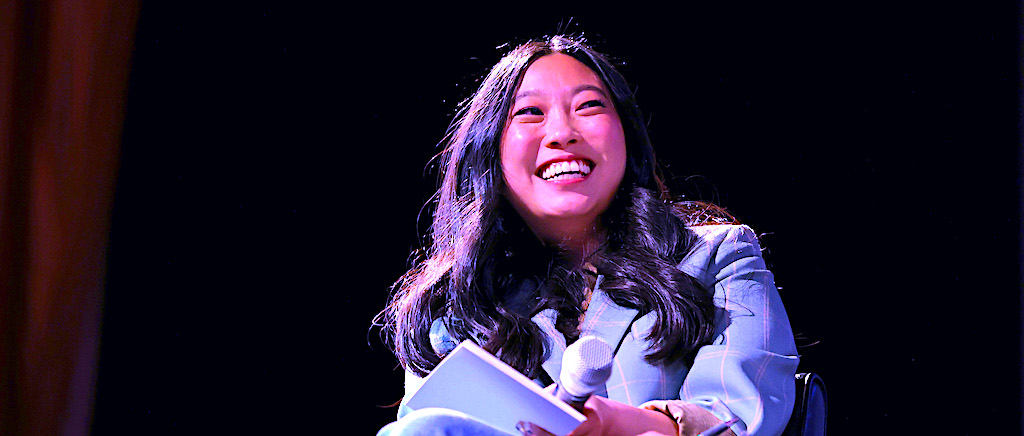
During a recent press event for Shang-Chi And The Legend Of The Ten Rings, Awkwafina was challenged about her use of a so-called “Blaccent” in her early career, prompting a stumbling response from the rapper turned film star as she struggled to address the criticisms that have trailed her since she dropped her first music video for “My Vag” in 2012. When a clip of the interview hit Twitter, Awkwafina became a trending topic as commenters excoriated her for her inability to address the controversy after so many years in the spotlight.
It’s clear that the star was caught off-guard by the question and there are a number of reasons that could be. Interviews are a lot like quizzes; their subjects often practice giving the “correct” answers to questions they know they’ll be asked about their current projects. It’s likely that Awkwafina wasn’t fully prepared to answer a question about Girl Code or Yellow Ranger when she had “studied” to answer questions about her role in a Marvel superhero film.
However, part of the reason fans were so irritated by her non-answer is that she’s had several opportunities to form a coherent answer and just hasn’t. She’s done similar press runs for Ocean’s 8 and The Farewell and these criticisms followed her even then. As her profile grows, her response grows truer and truer. A real conversation does need to be had about why what she did was problematic — but also about how little of that has to do with her getting booked in a handful of Disney movies in the same year.
When she dropped “My Vag” in 2012, Awkwafina was part of a growing wave of rappers challenging the industry status quo and subverting the existing systems of selling and promoting music. She was also problematic. Both things can be true at once. However, at the time, Awkwafina was feted as an example of both a female rapper succeeding in the male space of rap music and an Asian woman offering an alternative perspective to rap’s rich and growing landscape.
However, even then, she faced criticism for her use of comedy as the defining characteristic of her music and many thought her presentation felt more like imitation or flat-out mockery, similarly to the reception of white male rapper Lil Dicky (who also found success in a pivot to acting). Some of this probably had to do with the existing stereotypes of Asian women in the popular imagination. Because it was so rare to see an Asian woman presenting herself so brashly, decked out in streetwear, it was easy to dismiss these elements as affectations meant to endear her to rap’s perceived audience.
I’m not here to argue whether Awkwafina’s presentation was authentic or not. Lord knows that many people of color in America are familiar with the concept of “code-switching” — acting differently in different environments. Unfortunately, Awkwafina was celebrated for behaving in a way that many people — mostly Black people — are punished for. While a plethora of Black comediennes were overlooked or demeaned for talking professionally the way they talk at home (see: Tiffany Haddish, who has definitely received more than her fair share of denigration), Awkwafina’s star has risen, with much of the main draw being the clownish character she often played in her rap videos.
Recently, though, it seems like she’s toned that down a lot; in her more recent features, for example, she’s derived more comedy from her incredulous, blunt but affable nature. In Raya And The Last Dragon, her character gets more laughs from being chronically naive and insecure than speaking in African American Vernacular English. Likewise, Katy in Shang-Chi is just a fish out of the water, bewildered by the mystical goings-on around her.
Does that mean she’s learned her lesson? I don’t know and I won’t hazard a guess. It is a sign that she’s growing as a person and as an artist, which is something we need to give people time, space, and grace to actually do. Not everyone can instantly rattle off a master’s thesis on complex sociological issues when prompted — although, now might be a good time for her to start studying (better late than never). But expecting her to, when that energy could be used more productively, doesn’t change much either.
Instead, why don’t we hold the systems of power in Hollywood, in business, in government accountable for holding back some people and rewarding others based on prejudices and stereotypes? Why don’t we champion positive examples of people using their platforms in ways we approve of, and acknowledge their achievements rather than angrily tearing down those we don’t? Imagine if all those people criticizing Awkwafina were praising Audrey Nuna, Ramengvrl, or Ruby Ibarra (all of whom use their music to call out injustice)?
Awkwafina may have benefitted from an unfair system, but she isn’t responsible for it. While there does need to be a conversation about it, that conversation should be had in the right forum, not during a random interview during a press tour for a Disney movie. On the other hand, when stars are called out, they should probably have something better to say than “we need to have a conversation.” And everybody should strive to do better in the future because actions will always speak louder than words.
